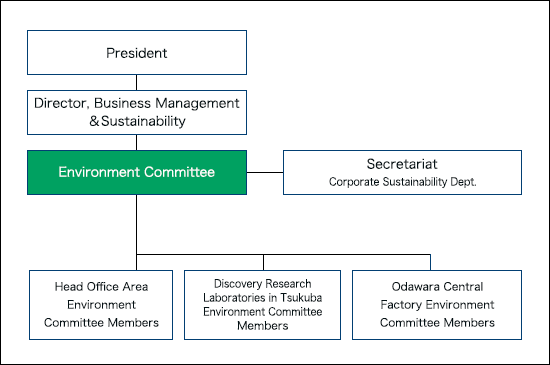The impact on the global environment, including that from abnormal weather, has been increasingly serious year by year. To pass on rich nature to the future generations, it has become more important than ever to be fully aware that we live together with nature and thus to conduct business activities in harmony with the global environment.
Nippon Shinyaku recognizes its responsibility for its impact on the environment and has established the Basic Environmental Policy.
Basic Environmental Policy
At the Nippon Shinyaku Group, our mission is to help people lead healthier, happier lives. In order to realize a sustainable society, we strive to protect, sustain, and improve the environment through eco-considerate business activities.
1. Promotion of environmental conservation initiatives
We will effectively operate the Nippon Shinyaku Group organization and establish clear targets for our collective pursuit of environmental conservation initiatives.
2. Initiatives for global environmental preservation
To preserve the global environment, we will work to reduce greenhouse gas [GHG] emissions, use energy and water efficiently, appropriately manage wastewater and gaseous emissions, reduce and recycle waste, and conserve biodiversity.
3. Legal compliance
We will comply with the environmental laws and regulations of each country or region where we operate, our internal environmental rules and all other applicable rules to fulfill our social responsibility.
4. Education and training
We will educate and train all directors and employees so that they can recognize the importance of environmental conservation and act in a responsible manner.
5. Appropriate disclosure of information
We will proactively disclose information about our environmental preservation activities and communicate with our local communities and other stakeholders to build relationships of trust with them.
- Enactment date (version 1): January 26, 1998
- Revision date (version 2): June 27, 2002
- Revision date (version 3): April 1, 2017
- Revision date (version 4): March 1, 2022
- Revision date (version 5): April 1, 2024
- Enacted by the Board of Directors
Environmental Management System
Nippon Shinyaku has established the Environment Committee, chaired by the Director, Business Management & Sustainability, to ensure effective implementation of the Nippon Shinyaku Group Basic Environmental Policy. The Environmental Committee is responsible for establishing the targets and management system for the Nippon Shinyaku Group's environmental preservation activities. The Committee deliberates and makes decisions on these matters and reports decisions to the Sustainability Committee for approval. In addition, with the aim of promoting environmental preservation activities, the Environment Committee formulates voluntary environmental targets and manages the progress, as well as promotes initiatives to address environmental issues.

Environmental Targets Plan
The Environment Target Plan specifies specific targets to achieve the Basic Environmental Policy.
Since 2005, Nippon Shinyaku has formulated the Environmental Targets Plan every three years to promote environmental improvement activities.
We are now working to achieve the 7th Nippon Shinyaku Environmental Targets (for FY2023–2025) with the aim of increasing our corporate value based on ESG management and helping create a sustainable society through our practical efforts to attain the SDGs.
The 7th Nippon Shinyaku Voluntary Environmental Targets (FY 2023-2025)
| Item | Targets |
|---|---|
| Climate change alleviation | Greenhouse gass emissions(Scope 1, 2) by FY 2030 by 42% from the FY 2020 benchmark. |
| Greenhouse gass emissions(Scope 1, 2) by FY 2025 by 21% from the FY 2020 benchmark. | |
| Water resources management | Reduce water use intensity by 10% from the FY2021 level by FY2025. |
| Waste management | Reduce the amount of waste for final disposal by 75% from the FY2005 level by FY2025. |
| Set the target waste plastic recycling rate for FY2025 at 65% or above. | |
| Set the target waste recycling rate for FY2025 at 60% or above. | |
| Chemical substance management | Promote appropriate management of chemical substances, including those designated in the pollutant release and transfer register (PRTR) system provided for by the Act on the Assessment of Releases of Specified Chemical Substances in the Environment and the Promotion of Management Improvement, and constantly reduce releases of such substances in the environment. |
| Environmental management | Continue the certification of the environmental management systems (ISO 14001 and KES Step 2) so as to effectively improve environmental performance. |
| Biodiversity | Promote biodiversity conservation activities. |
Environmental Management System
As a measure to promote constant environmental improvement at the Odawara Central Factory, its production base, Nippon Shinyaku acquired certification as complying with ISO 14001, an international standard for environmental management systems in August 2004. Since then, the company has promoted continuous environmental management activities at the factory. In June 2012, the company acquired Kyoto Environmental Management System Standard (KES) Step 2 certification at its Head Office, which is its research and development base. Since then, the company has promoted environmental management activities at its Head Office. In FY2023, the Odawara Central Factory and the Head Office underwent external reviews, which revealed no serious risks of environmental pollution and permitted both business locations to maintain the certification they had.
ISO 14001-certified facilities account for 33% of production facilities owned by Nippon Shinyaku and its consolidated subsidiaries and for 100% of production facilities owned by Nippon Shinyaku alone.







